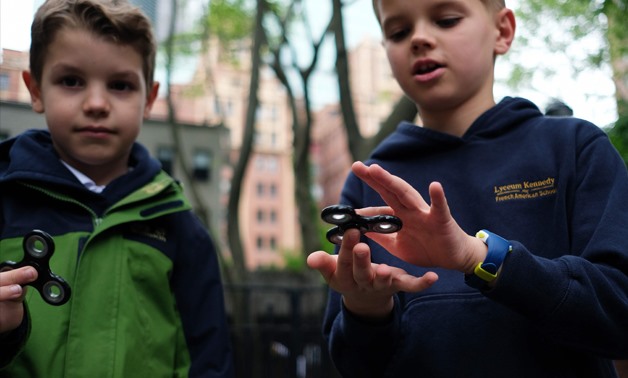
Eight-year-old Tom Wuestenberg (L) and his ten-year-old brother Louis play with fidget spinners - AFP/JEWEL SAMAD
New York, May 25, 2017 (AFP) - It was supposed to calm nerves, relieve stress and improve concentration but a new anti-fidget toy spreading fast through US and European schools is whipping up anger among teachers on both sides of the Atlantic.
Just months after the "fidget spinner" first whirled its way into the hands of antsy youngsters, some schools have already banned it - prompting a debate about difficulties children experience concentrating.
"The fidget spinners came out of nowhere, and then it seemed every other kid had them," said Meredith Daly, a sixth-grade teacher at a public school outside Phoenix, Arizona. "The kids would say, 'Oh it helps me calm down.' I did not really know what to think at first."
Sold for just a few dollars, the spinning top-like gadget divided into two or three branches, has proved a surprise hit this spring, first in the United States and then across Europe after its release on the continent last month.
The spinners have the advantage of being silent, Daly says -- a relief to many grown-ups after months of "bottle flip," a popular game that involves spinning a bottle of water until it lands upright.
But it quickly became clear that with "the fidget spinner, you need to keep it going, they want to look at it spinning around... it is too distracting if you are trying to learn something new," she said.
"So we all decided 'No fidget spinners -- keep them in your backpacks!'"
Like many American teachers who have recently vented their irritation on Twitter, Daly tolerates them only at parents' express request. Or when the need arises, as is sometimes the case for children with attention problems, hyperactivity or certain forms of autism.
Other schools in the United States, France and England have banned them, even during recess, much to the annoyance of children like Tom Wuesteberg.
"It would help (to have them in school)... if I don't want to do my work anymore, I take my fidget, do a little spin and then get back to work," the eight-year-old New Yorker originally from Belgium says.
Noelle Cullimore, who lives in Long Island with her two children, says spinning helps her 10-year-old son, who has Attention Deficit Hyperactivity Disorder (ADHD), to relax.
"He spins it at the bus stop or in the car, it really does keep him occupied, and for the most part it has been good for him."
It's not just for kids. Adults also like to use spinners as a way "to burn out stress," says Richard Gottlieb, CEO of Global Toy Expert.
"People do want to fidget," he says. "There is so much to worry about the world right now that people need a way to work out stress."
As annoying as it may be, many teachers recognize that a growing number of children need to play with something in their hands to concentrate better and are now more tolerant of students clicking pens or tapping their feet.
Stress balls and wiggle seats have become common in schools, Daly says.
"We could probably make a lot of money if we could come up with that quiet, effective toy that kids could do while they are writing an essay."
One of the contenders to fill that void is the Fidget Cube, a small plastic box whose every side offers a new possibility to keep fidgety fingers occupied.
A runaway success on the crowd-funding site Kickstarter, it has spawned multiple imitations.
"This behavior (fidgeting) isn't one that should continue to be stigmatized and mocked as unbecoming or inappropriate," the inventors of the Fidget Cube said in a press release.
"We are passionate about the idea that fidgeting is a process that, with the right tools and outlet, can have positive and real-life applications."


Comments
Leave a Comment